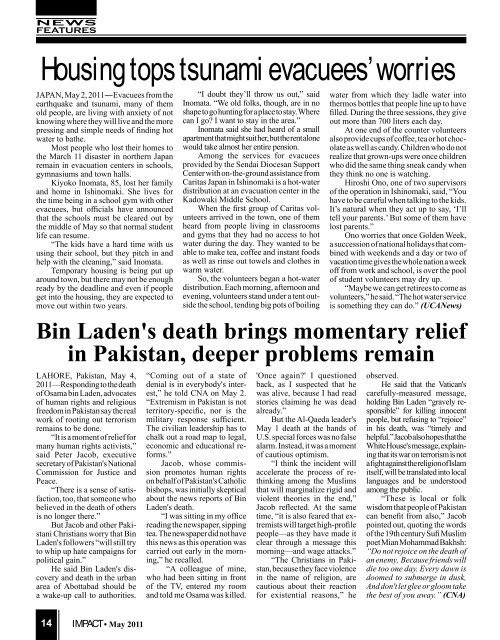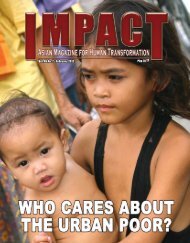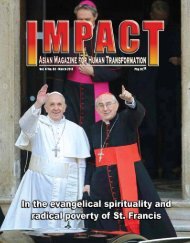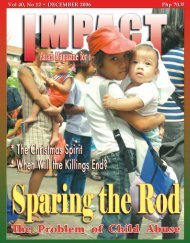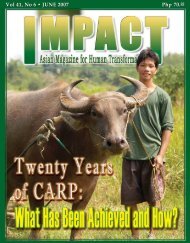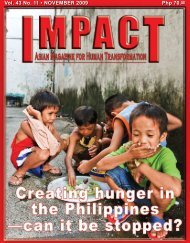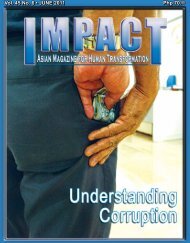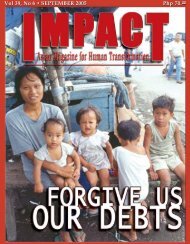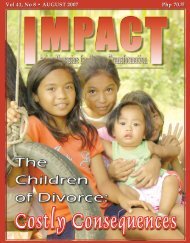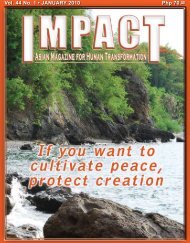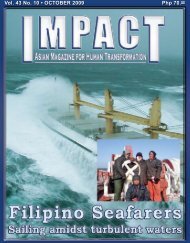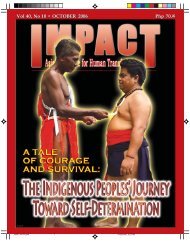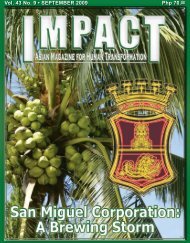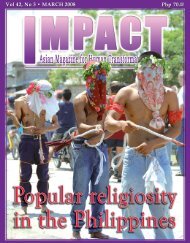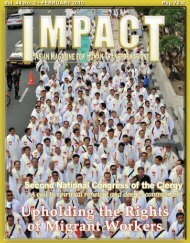Php 70.00 Vol. 45 No. 5 • MAY 2011 - IMPACT Magazine Online!
Php 70.00 Vol. 45 No. 5 • MAY 2011 - IMPACT Magazine Online!
Php 70.00 Vol. 45 No. 5 • MAY 2011 - IMPACT Magazine Online!
Create successful ePaper yourself
Turn your PDF publications into a flip-book with our unique Google optimized e-Paper software.
NEWS<br />
FEATURES<br />
Housing tops tsunami evacuees’ worries<br />
JAPAN, May 2, <strong>2011</strong>―Evacuees from the<br />
earthquake and tsunami, many of them<br />
old people, are living with anxiety of not<br />
knowing where they will live and the more<br />
pressing and simple needs of finding hot<br />
water to bathe.<br />
Most people who lost their homes to<br />
the March 11 disaster in northern Japan<br />
remain in evacuation centers in schools,<br />
gymnasiums and town halls.<br />
Kiyoko Inomata, 85, lost her family<br />
and home in Ishinomaki. She lives for<br />
the time being in a school gym with other<br />
evacuees, but officials have announced<br />
that the schools must be cleared out by<br />
the middle of May so that normal student<br />
life can resume.<br />
“The kids have a hard time with us<br />
using their school, but they pitch in and<br />
help with the cleaning,” said Inomata.<br />
Temporary housing is being put up<br />
around town, but there may not be enough<br />
ready by the deadline and even if people<br />
get into the housing, they are expected to<br />
move out within two years.<br />
“I doubt they’ll throw us out,” said<br />
Inomata. “We old folks, though, are in no<br />
shape to go hunting for a place to stay. Where<br />
can I go? I want to stay in the area.”<br />
Inomata said she had heard of a small<br />
apartment that might suit her, but the rent alone<br />
would take almost her entire pension.<br />
Among the services for evacuees<br />
provided by the Sendai Diocesan Support<br />
Center with on-the-ground assistance from<br />
Caritas Japan in Ishinomaki is a hot-water<br />
distribution at an evacuation center in the<br />
Kadowaki Middle School.<br />
When the first group of Caritas volunteers<br />
arrived in the town, one of them<br />
heard from people living in classrooms<br />
and gyms that they had no access to hot<br />
water during the day. They wanted to be<br />
able to make tea, coffee and instant foods<br />
as well as rinse out towels and clothes in<br />
warm water.<br />
So, the volunteers began a hot-water<br />
distribution. Each morning, afternoon and<br />
evening, volunteers stand under a tent outside<br />
the school, tending big pots of boiling<br />
water from which they ladle water into<br />
thermos bottles that people line up to have<br />
filled. During the three sessions, they give<br />
out more than 700 liters each day.<br />
At one end of the counter volunteers<br />
also provide cups of coffee, tea or hot chocolate<br />
as well as candy. Children who do not<br />
realize that grown-ups were once children<br />
who did the same thing sneak candy when<br />
they think no one is watching.<br />
Hiroshi Ono, one of two supervisors<br />
of the operation in Ishinomaki, said, “You<br />
have to be careful when talking to the kids.<br />
It’s natural when they act up to say, ‘I’ll<br />
tell your parents.’ But some of them have<br />
lost parents.”<br />
Ono worries that once Golden Week,<br />
a succession of national holidays that combined<br />
with weekends and a day or two of<br />
vacation time gives the whole nation a week<br />
off from work and school, is over the pool<br />
of student volunteers may dry up.<br />
“Maybe we can get retirees to come as<br />
volunteers,” he said. “The hot water service<br />
is something they can do.” (UCANews)<br />
Bin Laden's death brings momentary relief<br />
in Pakistan, deeper problems remain<br />
LAHORE, Pakistan, May 4,<br />
<strong>2011</strong>—Responding to the death<br />
of Osama bin Laden, advocates<br />
of human rights and religious<br />
freedom in Pakistan say the real<br />
work of rooting out terrorism<br />
remains to be done.<br />
“It is a moment of relief for<br />
many human rights activists,”<br />
said Peter Jacob, executive<br />
secretary of Pakistan's National<br />
Commission for Justice and<br />
Peace.<br />
“There is a sense of satisfaction,<br />
too, that someone who<br />
believed in the death of others<br />
is no longer there.”<br />
But Jacob and other Pakistani<br />
Christians worry that Bin<br />
Laden's followers “will still try<br />
to whip up hate campaigns for<br />
political gain.”<br />
He said Bin Laden's discovery<br />
and death in the urban<br />
area of Abottabad should be<br />
a wake-up call to authorities.<br />
“Coming out of a state of<br />
denial is in everybody's interest,”<br />
he told CNA on May 2.<br />
“Extremism in Pakistan is not<br />
territory-specific, nor is the<br />
military response sufficient.<br />
The civilian leadership has to<br />
chalk out a road map to legal,<br />
economic and educational reforms.”<br />
Jacob, whose commission<br />
promotes human rights<br />
on behalf of Pakistan's Catholic<br />
bishops, was initially skeptical<br />
about the news reports of Bin<br />
Laden's death.<br />
“I was sitting in my office<br />
reading the newspaper, sipping<br />
tea. The newspaper did not have<br />
this news as this operation was<br />
carried out early in the morning,”<br />
he recalled.<br />
“A colleague of mine,<br />
who had been sitting in front<br />
of the TV, entered my room<br />
and told me Osama was killed.<br />
'Once again?' I questioned<br />
back, as I suspected that he<br />
was alive, because I had read<br />
stories claiming he was dead<br />
already.”<br />
But the Al-Qaeda leader's<br />
May 1 death at the hands of<br />
U.S. special forces was no false<br />
alarm. Instead, it was a moment<br />
of cautious optimism.<br />
“I think the incident will<br />
accelerate the process of rethinking<br />
among the Muslims<br />
that will marginalize rigid and<br />
violent theories in the end,”<br />
Jacob reflected. At the same<br />
time, “it is also feared that extremists<br />
will target high-profile<br />
people—as they have made it<br />
clear through a message this<br />
morning—and wage attacks.”<br />
“The Christians in Pakistan,<br />
because they face violence<br />
in the name of religion, are<br />
cautious about their reaction<br />
for existential reasons,” he<br />
observed.<br />
He said that the Vatican's<br />
carefully-measured message,<br />
holding Bin Laden “gravely responsible”<br />
for killing innocent<br />
people, but refusing to “rejoice”<br />
in his death, was “timely and<br />
helpful.” Jacob also hopes that the<br />
White House's message, explaining<br />
that its war on terrorism is not<br />
a fight against the religion of Islam<br />
itself, will be translated into local<br />
languages and be understood<br />
among the public.<br />
“These is local or folk<br />
wisdom that people of Pakistan<br />
can benefit from also,” Jacob<br />
pointed out, quoting the words<br />
of the 19th century Sufi Muslim<br />
poet Mian Mohammad Bakhsh:<br />
“Do not rejoice on the death of<br />
an enemy, Because friends will<br />
die too one day. Every dawn is<br />
doomed to submerge in dusk,<br />
And don't let glee or gloom take<br />
the best of you away.” (CNA)<br />
Dhaka archdiocese adds daycare center<br />
DHAKA, May 2, <strong>2011</strong>―Archbishop<br />
Paulinus Costa of Dhaka<br />
has opened the third daycare<br />
center for disable children in<br />
the capital city to accommodate<br />
more vulnerable kids in Church<br />
services.<br />
Asha (Hope)-2 was formally<br />
opened on April 29 in<br />
Tejturibazar area in the center<br />
of the city. It can look after<br />
20 children, free of charge for<br />
parents who cannot afford to<br />
take care of them or who work<br />
during the day.<br />
About 70 participants, mostly<br />
disabled people and their parents,<br />
along with Church leaders<br />
and Caritas Bangladesh officials,<br />
Mining, from page 7<br />
In 2010, Oceana Gold had completed a<br />
private placement in Canada of 12,023,360<br />
special warrants at a price of $3.50 per special<br />
warrant for aggregate gross proceeds<br />
of $42,081,760. The private placement<br />
was led by Macquarie Capital Markets<br />
Canada Ltd. and Citigroup Global Markets<br />
Canada Inc.<br />
2. On April 19, <strong>2011</strong>, President Benigno<br />
Aquino III cancelled the Financial and<br />
Technical Assistance Agreements issued<br />
to MBMI Resources, Inc. covering some<br />
12,000 hectares of land in the municipalities<br />
of Rizal, Bataraza and Narra in Southern<br />
Palawan. MBMI Resources Inc. is a Canadian-based<br />
mining company focused on<br />
the exploration and development of nickel<br />
mineral properties in the area. Palawan is<br />
a small island ecosystem and mining will<br />
definitely put the communities in real danger<br />
and will threaten the extremely rich biodiversity<br />
of the island. Indigenous peoples in<br />
Palawan were also surprised last year when<br />
they were given a permit to mine despite<br />
the opposition of communities.<br />
Recently, a radio commentator and<br />
environment advocate opposing mining<br />
in Palawan was gunned down. This provided<br />
a protest action with the civil society<br />
launching the initiative to gather 10 million<br />
signatures to ask the government to stop<br />
mining in biodiversity rich province.<br />
3. On April 20, <strong>2011</strong>, Mindoro Resources<br />
Inc., a Canadian junior company<br />
based in Edmonton and listed in Toronto<br />
Stock Exchange announced that it will commence<br />
the Pre-Feasibility study for Agata<br />
attended the opening ceremony.<br />
“The center is disabledfriendly.<br />
We’ve set it out in such<br />
a way that the kids can easily<br />
use chairs and tables, electric<br />
switches and toilets. It will<br />
also help them to dress, eat and<br />
clean tables by themselves”,<br />
said Binoy Rodrigues, 41, the<br />
center director.<br />
The center, which was set<br />
up with personal efforts from<br />
Holy Cross auxiliary bishop<br />
Theotonius Gomes of Dhaka,<br />
is set to give parents a break<br />
from the challenges of family<br />
life as they struggle with the<br />
disabilities of their children.<br />
“My autistic and physically<br />
disabled son doesn’t listen<br />
to us and often gets angry<br />
with us. I hope the center will<br />
help him improve and become<br />
peaceful,” said Catholic housewife<br />
Anjona Gomes, <strong>45</strong>.<br />
Muslim Rejaul Karim, 50,<br />
said he was happy because my<br />
disabled daughter can now be<br />
kept near his residence, just two<br />
minutes walking distance. He<br />
used to drop his daughter Farjana<br />
Karim, 15, at the Church-run<br />
Father Pinos Dropping Center<br />
in Mirpur, on the northern<br />
outskirts of Dhaka.<br />
A Muslim mother, Amena Begum,<br />
said the Church-run daycare<br />
center is making a difference.<br />
Nickel Project in Surigao, Mindanao. In July<br />
2010, Mindoro Resources was granted 2.1<br />
Canadian dollars by the International Finance<br />
Corporation (IFC) to support this project.<br />
However, the Environmental and Social<br />
Review Summary of 2008 did not address<br />
the concern that the area for mining<br />
is part of the Lake Mainit watershed, the<br />
4th largest lake and home to 31 coastal<br />
villages. There are also allegations that the<br />
company secured the needed consent of the<br />
indigenous peoples in a highly questionable<br />
manner.<br />
With the above-given examples, and<br />
more similar cases all over the country, we<br />
affirm the findings in the research study<br />
conducted by The Canadian Center for the<br />
Study of Resource Conflict in 2009, that<br />
the Canadian mining companies had been<br />
prominently involved in environmental degradation,<br />
unethical behavior and in propagating<br />
conflicts among communities.<br />
Also, the aggressive pursuit of mining<br />
investments has necessarily spawned<br />
numerous human rights abuses, especially<br />
against individuals and communities opposed<br />
to mining. The abuse has included<br />
both physical and psychological harassment.<br />
A number of anti-mining advocates<br />
have also been killed. As of February <strong>2011</strong>,<br />
at least seven (7) anti-mining activists have<br />
sacrificed their lives in defense of their land<br />
and natural resources. One incident of this<br />
kind happened in Sibuyan, Romblon, now<br />
a Canadian-owned mining concession,<br />
Altai Resources, subsidiary of Altai Philippine<br />
Mining Corp. The purpose of killing<br />
NEWS<br />
FEATURES<br />
“My disabled son used to<br />
vandalize the household at will.<br />
He didn’t listen to anyone and<br />
also got lost several times,” she<br />
recalled, adding that her son<br />
completely changed after he<br />
was kept in Asha-1 at Nayanagar<br />
in eastern Dhaka.<br />
Bishop Theotonius Gomes,<br />
the mastermind of the welfare<br />
services who is the chairman<br />
of Episcopal Commission for<br />
HealthCare (ECHC), said: “We<br />
try to help parents realize that<br />
disabled children are not their<br />
burden. Even though they are<br />
born with disabilities they<br />
should be welcomed as gifts<br />
of God.” (UCANews)<br />
is clear, to cultivate a climate of fear and<br />
stifle opposition. But instead, it is breeding<br />
resistance and is strengthening a grassroots<br />
anti-mining movement.<br />
The transnational corporations have<br />
become very powerful players, doing intensified<br />
economic transactions that cross national<br />
boundaries. The policy or investment<br />
decisions are being formulated primarily by<br />
market considerations and not by national<br />
interest. As in the case of the Philippines and<br />
other developing countries, what is ironic<br />
is that national policies are being framed or<br />
reformulated to suit the dictated interest of<br />
the mining investment.<br />
The arena of struggle for anti-mining<br />
campaign should not totally rely on the<br />
strength of local victories. Since the issue<br />
and the new hierarchy of power have<br />
assumed global character, the campaign<br />
necessarily has to assume global engagement.<br />
Large-scale mining is not an isolated<br />
economic activity. It is always within the<br />
ambit of a larger network of interconnections<br />
and the dangers or risks that it poses<br />
are common to all other sites in other parts<br />
of the world. Given this situation, any effort<br />
to create global solidarity and cooperation,<br />
particularly among the church network, is<br />
a very welcome initiative. I<br />
(This piece was delivered by Fr. Edwin<br />
Garriguez, Executive Secretary of Episcopal<br />
Commission on Social Action, Justice<br />
and Peace, at the Ecumenical Mining<br />
Confernce in Toronto, Canada, on May<br />
1-3, 2001)<br />
14 <strong>IMPACT</strong> <strong>•</strong> May <strong>2011</strong><br />
<strong>Vol</strong>ume <strong>45</strong> <strong>•</strong> Number 5 15


